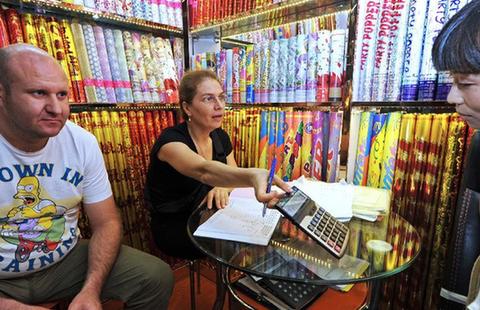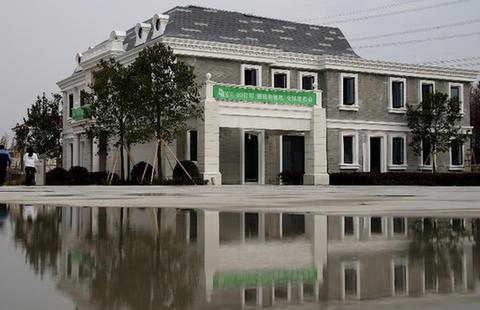Chinese banks expand financial services for companies going global
By Jiang Xueqing (China Daily) Updated: 2015-01-20 13:21Major State-owned banks are planning to offer a wide range of financial products to support the expansion of Chinese companies in overseas markets, reports Jiang Xueqing.
China's large State-owned lenders are planning to offer a slew of financial products in global markets, with an eye on the growing business opportunities arising from the overseas moves of domestic companies.
Industrial and Commercial Bank of China Ltd, the nation's largest lender by assets, had provided financial support worth $22 billion to help Chinese companies expand their businesses in 46 countries and regions by the end of June 2014. The companies covered more than 10 major sectors, including telecommunications, transportation, coal, oil and gas, manufacturing and construction.
Last year, the lender also arranged a syndicated loan of $7 billion for a Chinese consortium that agreed to invest $10.6 billion to buy and construct Glencore Xstrata Plc's Las Barmbas copper mine project in Peru. Completed in July, the transaction was the largest overseas merger and acquisition project led by a Chinese-funded bank in the metals and mining industry.
ICBC alone extended loans worth $2.1 billion and offered multiple services such as capital settlement, online banking and global cash management in overseas markets.
During the past few years, the bank supported a number of merger and acquisition projects, including China National Offshore Oil Corp's $15.1 billion takeover of Canadian oil and gas company Nexen Inc and Chengdu Tianqi Industry Group's more than $800 million acquisition of Australian lithium producer Talison Lithium Ltd.
The bank further expanded its global network in 2014 to recommend suitable acquisition targets to its clients, provide timely information on local conditions, and help conduct due diligence for business transactions.
As of June 30, ICBC had 331 overseas institutions in 40 countries and regions. Its agent banks covered 146 countries and regions, with foreign-funded agent banks amounting to 1,767.
The total assets of the bank's overseas institutions had reached $232.5 billion, up 11.1 percent from the beginning of 2014. Net profit of the overseas institutions increased 41 percent year-on-year to $1.2 billion and their nonperforming loan ratio was only 0.48 percent, well below the entire bank's NPL ratio of 0.99 percent.
Lin Fengyun, head of the global syndication division of the bank's special financing department, said: "Our next priorities are to make a transition from just following domestic companies to guiding them during the going global process. Instead of tracking cross-border mergers and acquisitions, we will take the initiative to make deals and create greater value by promoting cooperation between Chinese and foreign companies as well as integrating technologies, resources and market of both sides."
Mergers and acquisitions have a diversified demand for financing that needs a combination of various financial products. ICBC will deepen and broaden its efforts to develop a basket of products and services, including credit, cash management, letters of guarantee and investment banking. The bank will use its global network to spot valuable acquisition targets, help Chinese companies reduce acquisition costs and risks, and improve the post-acquisition synergistic effects, Lin said.
With the transformation of the Chinese economy, companies that expand their business overseas are setting higher requirements for banks, which are still lagging behind many of these companies in terms of globalization.
In Angola, Chinese companies used to sell shoes and garments in the early years and later moved on to project contracting and labor export. But now, they are making investments, paying taxes and creating jobs in the African country.
To adapt to the changes, banks have been expanding their financial services from the issuance of letters of credit and letters of guarantee to export credit, structured finance and investment banking, said Liu Wei, deputy head of structure and project finance of the corporate banking department II at ICBC.
While they help Chinese companies go global, banks are also facilitating the redistribution of excess capacity worldwide.
After the global financial crisis in 2008, a number of small and medium-sized shipyards went out of business and large shipyards faced a shortage of orders. ICBC has guided shipyards that meet the national requirements for industrial transformation and upgrade to export ships to other countries, said Li Dongkai, head of shipping finance division of the bank's special financing department.
The bank arranged a syndicated loan of $600 million to support the export of liquefied natural gas carriers to Papua New Guinea in 2012 and another loan of $1.2 billion for the production and export of LNG carriers to Australia in 2013.
Other large State-owned banks have also helped transfer China's excess capacity to other countries through project contracting, mergers and acquisitions, and the establishment of factories.
As of Sept 30, Bank of China Ltd had supported 1,332 "going global" projects of Chinese companies and promised to offer loans totaling $115.2 billion, rising 32 percent from the end of 2013.
It will support leading companies in certain industries, which have advantages over their foreign competitors, to better deploy their global layout, said Lin Jingzhen, general manager of the bank's corporate banking department.
- Finding the balance in changing global environment
- Trade with UK reaches record $81b in 2014
- China set to miss annual growth target
- Policy changes loom for financial institutions
- Economic growth edges to 24-year low of 7.4%
- Carmaker Autoeuropa exports rise by 12% in 2014
- Chinese 'makers' turn fake products market into innovation base
- Wang reported to take 20 percent stake in Atletico
















